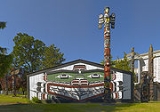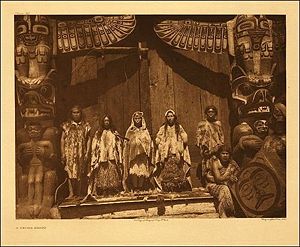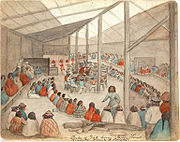
Potlatch
Encyclopedia
_a_kwakwakawakw_big_house.jpg)
Indigenous peoples of the Pacific Northwest Coast
The Indigenous peoples of the Pacific Northwest Coast are the pre-Columbian inhabitants of the Pacific Northwest Coast, their descendants, and many ethnic groups who identify with those historical peoples. They are now situated within the Canadian Province of British Columbia and the U.S...
of Canada and United States. This includes Heiltsuk Nation
Heiltsuk Nation
The Heiltsuk Nation is a First Nations government in the Central Coast region of the Canadian province of British Columbia, centred on the island community of Bella Bella, British Columbia...
, Haida, Nuxalk
Nuxálk Nation
The Nuxalk Nation , also referred to as the Bella Coola or Bellacoola, are an Indigenous First Nation in Canada, living in the area in and around Bella Coola, British Columbia...
, Tlingit, Makah, Tsimshian
Tsimshian
The Tsimshian are an indigenous people of the Pacific Northwest Coast. Tsimshian translates to Inside the Skeena River. Their communities are in British Columbia and Alaska, around Terrace and Prince Rupert and the southernmost corner of Alaska on Annette Island. There are approximately 10,000...
, Nuu-chah-nulth, Kwakwaka'wakw
Kwakwaka'wakw
The Kwakwaka'wakw are an Indigenous group of First Nations peoples, numbering about 5,500, who live in British Columbia on northern Vancouver Island and the adjoining mainland and islands.Kwakwaka'wakw translates as "Those who speak Kwak'wala", describing the collective nations within the area that...
, and Coast Salish
Coast Salish
Coast Salish languages are a subgroup of the Salishan language family. These languages are spoken by First Nations or Native American peoples inhabiting the territory that is now the southwest coast of British Columbia around the Strait of Georgia and Washington state around Puget Sound...
cultures. The word comes from the Chinook Jargon
Chinook Jargon
Chinook Jargon originated as a pidgin trade language of the Pacific Northwest, and spread during the 19th century from the lower Columbia River, first to other areas in modern Oregon and Washington, then British Columbia and as far as Alaska, sometimes taking on characteristics of a creole language...
, meaning "to give away" or "a gift"; originally from the Nuu-chah-nulth
Nuu-chah-nulth language
Nuu-chah-nulth is a Wakashan language spoken in the Pacific Northwest of North America, on the west coast of Vancouver Island from Barkley Sound to Quatsino Sound in British Columbia, by the Nuu-chah-nulth people...
word p̓ačiƛ, to make a ceremonial gift in a potlatch. It went through a history of rigorous ban by both the Canadian and United States' federal governments, and has been the study of many anthropologists.
Overview

Reciprocity (cultural anthropology)
In cultural anthropology and sociology, reciprocity is a way of defining people's informal exchange of goods and labour; that is, people's informal economic systems. It is the basis of most non-market economies. Since virtually all humans live in some kind of society and have at least a few...
of wealth.
Different events take place during a potlatch, like singing and dancing, sometimes with masks or regalia, such as Chilkat blankets
Chilkat weaving
Chilkat weaving is a traditional form of weaving practiced by Tlingit, Haida, Tsimshian, and other Northwest coastal tribes of Alaska and British Columbia. Chilkat blankets are worn by high-ranking tribal members on civic or ceremonial occasions, including dances.-Background:The name derives from...
, the barter of wealth through gifts, such as dried foods, sugar, flour, or other material things, and sometimes money. For many potlatches, spiritual ceremonies take place for different occasions. This is either through material wealth such as foods and goods or non-material things such as songs and dances. For some cultures, such as Kwakwaka'wakw
Kwakwaka'wakw
The Kwakwaka'wakw are an Indigenous group of First Nations peoples, numbering about 5,500, who live in British Columbia on northern Vancouver Island and the adjoining mainland and islands.Kwakwaka'wakw translates as "Those who speak Kwak'wala", describing the collective nations within the area that...
, elaborate and theatrical dances are performed reflecting the hosts' genealogy and cultural wealth. Many of these dances are also sacred ceremonies of secret societies like the hamatsa
Hamatsa
Hamatsa is the name of a Kwakwaka'wakw secret society. During the winter months the Kwakwaka'wakw of British Columbia have many ceremonies practiced by different secret societies...
, or display of family origin from supernatural
Supernatural
The supernatural or is that which is not subject to the laws of nature, or more figuratively, that which is said to exist above and beyond nature...
creatures such as the dzunukwa
Dzunukwa
Dzunukwa, also Tsonoqua, Tsonokwa, is a figure in Kwakwaka'wakw mythology . She is an ancestor of the Namgis clan through her son, Tsilwalagame...
. Typically the potlatching is practiced more in the winter seasons as historically the warmer months were for procuring wealth for the family, clan, or village, then coming home and sharing that with neighbors and friends.
Within it, hierarchical relations within and between clans, villages, and nations, are observed and reinforced through the distribution or sometimes destruction of wealth, dance performances, and other ceremonies. The status of any given family is raised not by who has the most resources, but by who distributes the most resources. The hosts demonstrate their wealth and prominence through giving away goods. Chief O'wax̱a̱laga̱lis of the Kwagu'ł describes the potlatch in his famous speech to anthropologist Franz Boas
Franz Boas
Franz Boas was a German-American anthropologist and a pioneer of modern anthropology who has been called the "Father of American Anthropology" and "the Father of Modern Anthropology." Like many such pioneers, he trained in other disciplines; he received his doctorate in physics, and did...
,
Celebration of births, rites of passages, weddings, funerals, namings, and honoring of the deceased are some of the many forms the potlatch occurs under. Although protocol differs among the Indigenous nations, the potlatch will usually involve a feast, with music, dance, theatricality and spiritual ceremonies. The most sacred ceremonies are usually observed in the winter.
It is important to note the differences and uniqueness among the different cultural groups and nations along the coast. Each nation, tribe, and sometimes clan has its own way of practicing the potlatch with diverse presentation and meaning. The potlatch, as an overarching term, is quite general, since some cultures have many words in their language for various specific types of gatherings. Nonetheless, the main purpose has been and still is the redistribution of wealth procured by families.
History

Canoe
A canoe or Canadian canoe is a small narrow boat, typically human-powered, though it may also be powered by sails or small electric or gas motors. Canoes are usually pointed at both bow and stern and are normally open on top, but can be decked over A canoe (North American English) or Canadian...
s, and slaves among the very wealthy, but otherwise not income-generating assets such as resource rights. The influx of manufactured trade goods such as blankets and sheet copper into the Pacific Northwest caused inflation in the potlatch in the late 18th and earlier 19th centuries. Some groups, such as the Kwakwaka'wakw
Kwakwaka'wakw
The Kwakwaka'wakw are an Indigenous group of First Nations peoples, numbering about 5,500, who live in British Columbia on northern Vancouver Island and the adjoining mainland and islands.Kwakwaka'wakw translates as "Those who speak Kwak'wala", describing the collective nations within the area that...
, used the potlatch as an arena in which highly competitive contests of status took place. In some cases, goods were actually destroyed after being received, or instead of being given away. The catastrophic mortalities due to introduced diseases laid many inherited ranks vacant or open to remote or dubious claim—providing they could be validated—with a suitable potlatch.
The potlatch was a cultural practice much studied by ethnographers. Sponsors of a potlatch give away many useful items such as food, blankets, worked ornamental mediums of exchange called "coppers," and many other various items. In return, they earned prestige. To give a potlatch enhanced one's reputation and validated social rank, the rank and requisite potlatch being proportional, both for the host and for the recipients by the gifts exchanged. Prestige increased with the lavishness of the potlatch, the value of the goods given away in it.
Potlatch ban
Potlatching was made illegal in Canada in 1884 in an amendment to the Indian ActIndian Act
The Indian Act , R.S., 1951, c. I-5, is a Canadian statute that concerns registered Indians, their bands, and the system of Indian reserves...
and the United States in the late 19th century, largely at the urging of missionaries and government agents who considered it "a worse than useless custom" that was seen as wasteful, unproductive, and contrary to civilized values.
The potlatch was seen as a key target in assimilation policies and agendas. Missionary William Duncan wrote in 1875 that the potlatch was "by far the most formidable of all obstacles in the way of Indians becoming Christians, or even civilized." Thus in 1884, the Indian Act
Indian Act
The Indian Act , R.S., 1951, c. I-5, is a Canadian statute that concerns registered Indians, their bands, and the system of Indian reserves...
was revised to include clauses banning the Potlatch
The Potlatch Ban (Canada)
The Potlatch Ban occurred in 1885. This event saw the government of the newly formed Dominion of Canada make the Native Canadian ceremony, known as the Potlatch, illegal through legislation.-History:...
and making it illegal to practice. Section 3 of the Act read,
Eventually the potlatch law, as it became known, was amended to be more inclusive and address technicalities that had led to dismissals of prosecutions by the court. Legislation included guests who participated in the ceremony. The indigenous people were too large to police and the law too difficult to enforce. Duncan Campbell Scott convinced Parliament to change the offense from criminal to summary, which meant "the agents, as justice of the peace, could try a case, convict, and sentence." Even so, except in a few small areas, the law was generally perceived as harsh and untenable. Even the Indian agents employed to enforce the legislation considered it unnecessary to prosecute, convinced instead that the potlatch would diminish as younger, educated, and more "advanced" Indians took over from the older Indians, who clung tenaciously to the custom.
Continuation
Sustaining the customs and culture of their ancestors, indigenous people now openly hold potlatch to commit to the restoring of their ancestors' ways. Potlatch now occur frequently and increasingly more over the years as families reclaim their birthright. The ban was only repealed in 1951.See also
- Athabaskan PotlatchAthabaskan Potlatch-History:The traditional Athabaskan potlatch had, “social, religious and economic significance." The traditional potlatch was a gathering that combined aspects of competition, peace keeping and a show of wealth...
- CommunismCommunismCommunism is a social, political and economic ideology that aims at the establishment of a classless, moneyless, revolutionary and stateless socialist society structured upon common ownership of the means of production...
- KohaKoha (custom)Koha is a New Zealand Māori custom which can be translated as gift, present, offering, donation or contribution.-Traditional usage:Koha is an example of the reciprocity which is a common feature of much Māori tradition, and often involves the giving of gifts by visitors to a host marae...
, a similar concept among the Māori - Kula ringKula ringKula, also known as the kula exchange or kula ring, is a ceremonial exchange system conducted in the Milne Bay Province of Papua New Guinea.The Kula ring spans 18 island communities of the Massim archipelago, including the Trobriand Islands...
, a similar concept in the Trobriand IslandsTrobriand IslandsThe Trobriand Islands are a 450 km² archipelago of coral atolls off the eastern coast of New Guinea. They are situated in Milne Bay Province in Papua New Guinea. Most of the population of 12,000 indigenous inhabitants live on the main island of Kiriwina, which is also the location of the...
(Oceania) - MokaMoka exchangeThe Moka is a system of exchange in the Mt. Hagen area, Papua New Guinea.It is a complex system of exchange that relies heavily on pigs as currency for status in the community....
, another similar concept in Papua New GuineaPapua New GuineaPapua New Guinea , officially the Independent State of Papua New Guinea, is a country in Oceania, occupying the eastern half of the island of New Guinea and numerous offshore islands... - Sepik Coast exchangeSepik Coast exchangeSepik Coast exchange is the method of social networking and alliance in the Sepik Coast area of Papua New Guinea.Families living along the Sepik Coast in northern Papua New Guinea form alliances with families in other communities. Depending on the importance and status of the family, it can have...
, yet another similar concept in Papua New GuineaPapua New GuineaPapua New Guinea , officially the Independent State of Papua New Guinea, is a country in Oceania, occupying the eastern half of the island of New Guinea and numerous offshore islands... - Guy DebordGuy DebordGuy Ernest Debord was a French Marxist theorist, writer, filmmaker, member of the Letterist International, founder of a Letterist faction, and founding member of the Situationist International . He was also briefly a member of Socialisme ou Barbarie.-Early Life:Guy Debord was born in Paris in 1931...
, French Situationist writer on the subject of potlatch and commodity reificationReification (Marxism)Reification or Versachlichung, literally "objectification" or regarding something as a separate business matter) is the consideration of an abstraction, relation or object as if they had human or living existence and abilities, when in reality they do not...
. - Gift economyGift economyIn the social sciences, a gift economy is a society where valuable goods and services are regularly given without any explicit agreement for immediate or future rewards . Ideally, simultaneous or recurring giving serves to circulate and redistribute valuables within the community...
- PotluckPotluckA potluck is a gathering of people where each person or group of people contributes a dish of food prepared by the person or the group of people, to be shared among the group...
(Folk etymology has derived the term "potluck" from the Native AmericanIndigenous peoples of the AmericasThe indigenous peoples of the Americas are the pre-Columbian inhabitants of North and South America, their descendants and other ethnic groups who are identified with those peoples. Indigenous peoples are known in Canada as Aboriginal peoples, and in the United States as Native Americans...
custom of potlatch) - Pow wowPow woWPow woW is French musical group. Their biggest hit was "Le Chat" in 1992. Their next single was the French version of song "The Lion Sleeps Tonight", titled "Le lion est mort ce soir".- Albums :* Regagner les plaines...
a gathering whose name is derived from the NarragansettNarragansett (tribe)The Narragansett tribe are an Algonquian Native American tribe from Rhode Island. In 1983 they regained federal recognition as the Narragansett Indian Tribe of Rhode Island. In 2009, the United States Supreme Court ruled against their request that the Department of Interior take land into trust...
word for "spiritual leader."
External links
- U'mista Museum of potlatch artifacts.
- Potlatch An exhibition from the Peabody Museum, Harvard University.
- University of Washington Libraries Digital Collections – Oliver S. Van Olinda Photographs A collection of 420 photographs depicting life on Vashon Island, Whidbey Island, Seattle and other communities around Puget SoundPuget SoundPuget Sound is a sound in the U.S. state of Washington. It is a complex estuarine system of interconnected marine waterways and basins, with one major and one minor connection to the Strait of Juan de Fuca and the Pacific Ocean — Admiralty Inlet being the major connection and...
, Washington, from the 1880s through the 1930s. This collection provides a glimpse of early pioneer activities, industries and occupations, recreation, street scenes, ferries and boat traffic at the turn of the century. Also included are a few photographs of Native American activities such as documentation of a potlatch on Whidbey Island.

